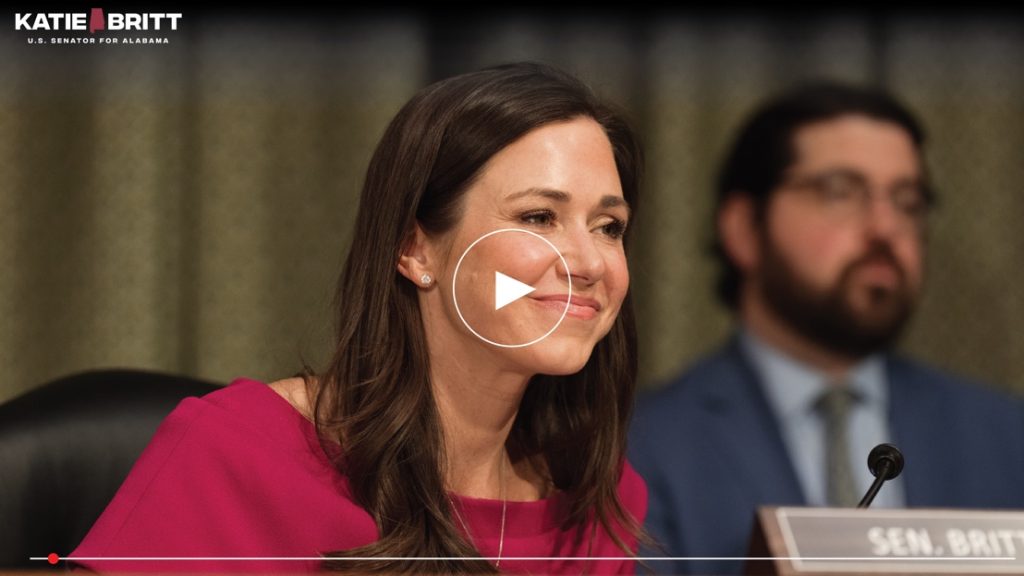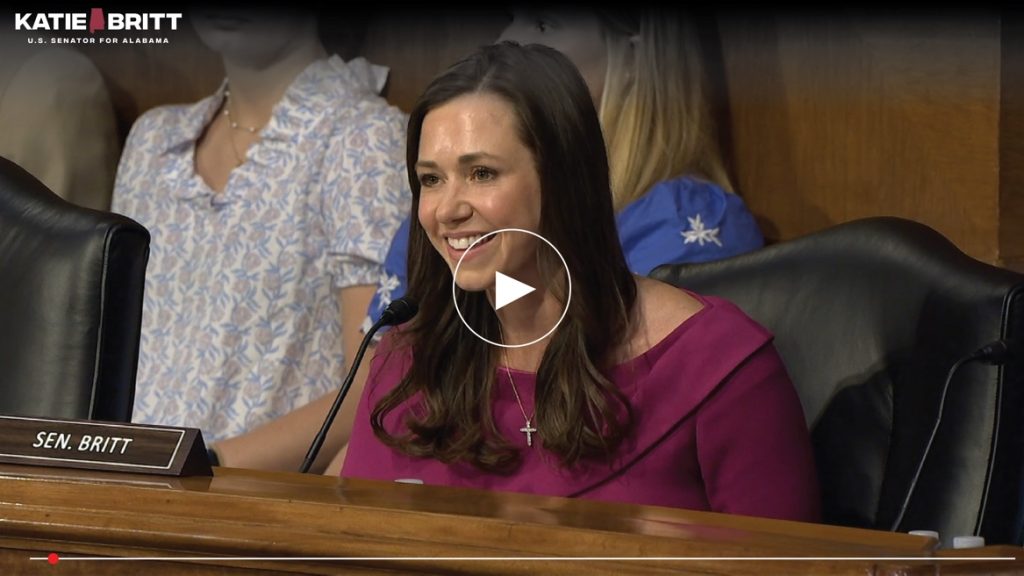U.S. Senator Katie Britt Introduces Alabama Witness at Appropriations Hearing, Highlights UAB O’Neal Cancer Center
WASHINGTON, D.C. – U.S. Senator Katie Britt (R-Ala.) participated in a Senate Appropriations Committee Hearing entitled “Biomedical Research: Keeping America’s Edge in Innovation.” The hearing included multiple witnesses including Dr. Barry Sleckman, Director of the University of Alabama at Birmingham’s (UAB) O’Neal Comprehensive Cancer Center, Alabama’s only National Cancer Institute-designated Comprehensive Cancer Center.

Appropriations Committee Chairman Susan Collins (R-Maine) invited Senator Britt to deliver introductory remarks prior to Dr. Sleckman’s testimony before the Committee. “It is a distinct honor to introduce Dr. Barry Sleckman, a leading voice in cancer research and patient care and a true asset to the whole state of Alabama and to our nation,” Senator Britt began.
“Thanks to his leadership, UAB’s O’Neal Comprehensive Cancer Center has continued to fulfill its mission, bringing hope to families and communities with the ultimate vision of a life without cancer for patients across Alabama and the southeast. We are blessed to have him and his expertise and his commitment in Alabama, and I am grateful he is here with us today to share his insights,” she continued.
Senator Britt began her line of questioning by expressing gratitude for UAB O’Neal’s lifesaving work and care. “. . . we have a number of Alabamians, one of which I had an opportunity to meet this morning, Gary Cornelius, to tell his story, to talk about his journey and to say thank you to the O’Neal Comprehensive Cancer Research Center for saving his life. And the truth is, is everyone knows a story like Gary’s. It’s either ours, personally, it’s a loved one’s, it’s a family member, it’s a neighbor, it’s a coworker. And so we understand that smart investment and continued research is essential to make sure that we can save lives and change lives moving forward,” said Senator Britt.

The Senator first asked Dr. Sleckman about current initiatives at UAB, saying, “What are some of the things that you’re doing and investing in that will ultimately change lives in the future?”
Dr. Sleckman answered, “. . . what I love more than anything is someone that comes into my office, and says, yeah, we just had an amazing new finding in lab that we think will shed important insight into a disease, a cancer, or potentially a new treatment for a cancer or treatment of a resistant cancer. So those are the kind of things that are going on at the O’Neill Comprehensive Cancer Center. And honestly, those are the kind of things that are going on at all of the 72 other NCI designated cancer centers in this country, thanks to the support of that program.”
Senator Britt continued her line of questioning by asking about a rise in cancer incidence across the country, “What would you say is attributable to that? . . . What do you think about the fact that we feel like the younger population, we’ve seen an increase in cancer there as well?”
“Thank you for those questions, Senator Britt,” Dr. Sleckman responded. “I think that first of all, the incidence of cancer is definitely rising in this country, and I would say that will probably continue to rise . . . I would say we’re probably not investing enough, and we’re not doing a good enough job. There are still plenty of people in this country who smoke. There’s an obesity epidemic in several states, including our own.”
Dr. Sleckman continued, “But the major risk factor, the major number one risk factor for cancer is age . . we’re having such great success with research in approaching other diseases, cardiovascular diseases, pulmonary diseases, renal diseases, neurologic diseases, infectious diseases, all things that would have killed citizens in this country before they got cancer, they’re now living to a much older age where they increase the risk of getting cancer.”
Dr. Sleckman also addressed the Senator’s concerns with the rise in cancer incidence among younger individuals, saying this issue has “cropped up over the last couple of years where, younger groups of people, some in their 20s, for example, are developing colon cancer. This is a serious problem. It hasn’t reached epidemic levels yet, but it is disturbing that this has come up. There are new grant RFAs to actually begin to study this. I think that at this point, no one really has a good idea why that is. But we all know that we need to figure that out quickly.”
Senator Britt asked Dr. Sleckman, in her final line of questioning, “Can you tell the committee why federal funding is unique in cancer prevention research?”
“Federal funding is unique in cancer prevention research, in part, because there are not a lot of other revenue streams for cancer prevention. This is not really a high priority, for example, for industry and pharma. And so federal funding, to understand how to develop cancer prevention approaches, is critical,” Dr. Sleckman responded.
###